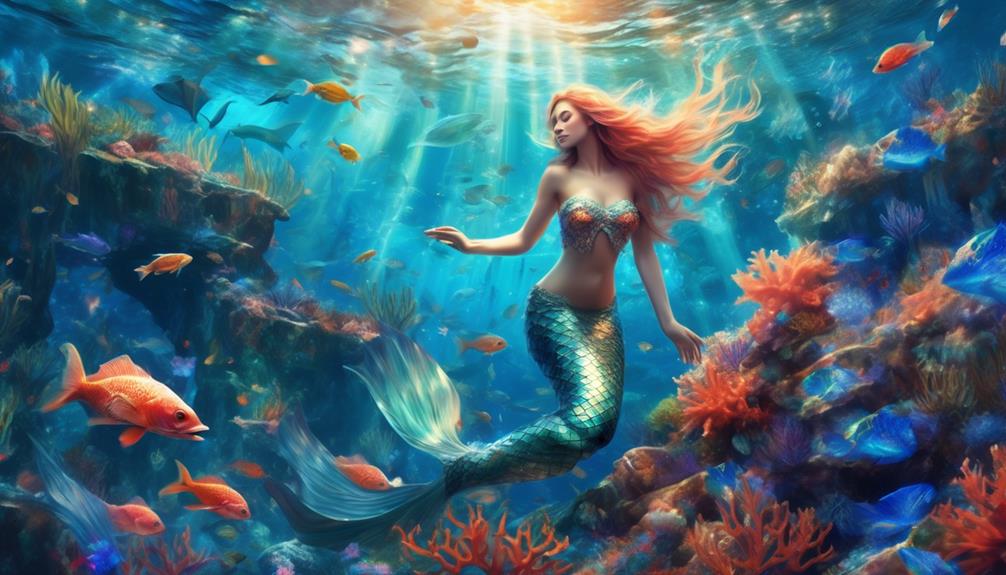Mermaid myths have long captured the imagination of people around the world, often conjuring up images of mystical creatures with a deep connection to the sea. However, beneath the enchanting tales lies a potential avenue for raising awareness about marine conservation.
The intersection of these fanciful legends and real-world efforts to protect our oceans presents an intriguing opportunity to explore the ways in which mermaid lore can be utilized to promote greater understanding and action for the preservation of marine ecosystems.
As this discussion unfolds, it will become evident how these age-old myths hold the potential to inspire a renewed sense of appreciation and responsibility towards our oceans and the creatures that inhabit them.
Key Takeaways
- Mermaid myths have a rich cultural and historical connection to the marine world, making them impactful in shaping attitudes towards the environment.
- Mermaid lore can be leveraged as a tool for raising awareness and engaging a broader audience in marine ecosystem preservation.
- Overcoming misconceptions and challenges surrounding mermaid myths is crucial for effective marine conservation.
- The symbolism of mermaids in marine conservation efforts can draw attention to the beauty and fragility of the oceans, inspiring action for preservation.
Origins of Mermaid Myths
The origins of mermaid myths can be traced back to ancient civilizations across the globe, where tales of mysterious sea creatures captivated the imaginations of people living near the water.
Historical origins reveal that these myths have roots in diverse cultures, including Greek, Roman, and Near Eastern folklore. The cultural significance of mermaids varied widely, with some societies viewing them as omens of misfortune, while others revered them as symbols of love and beauty.
These myths often served as cautionary tales, warning sailors and coastal communities of the dangers lurking beneath the waves. The enduring appeal of mermaid myths lies in their ability to reflect the complex relationship between humans and the sea, making them a fascinating subject for exploration and understanding of our historical and cultural connections to the marine world.
Cultural Impact on Conservation
Exemplifying a rich tapestry of cultural beliefs and traditions, mermaid myths have permeated societies worldwide, leaving an indelible mark on marine conservation efforts.
Cultural traditions play a significant role in shaping attitudes and behaviors towards the environment. The impact of mermaid myths on marine conservation is profound, as these stories often emphasize the importance of protecting the oceans and its inhabitants.
Across various cultures, mermaids are depicted as guardians of the sea, symbolizing the interconnectedness between humans and the marine environment. These cultural narratives have the potential to instill a sense of responsibility and stewardship for marine ecosystems.
Conservation Efforts and Mermaid Lore
Amalgamating folklore with modern conservation efforts, mermaid lore serves as a compelling catalyst for raising awareness about marine ecosystem preservation.
The cultural significance of mythical creatures like mermaids has long been intertwined with the ocean and its conservation. By leveraging the enchanting allure of mermaid myths, conservationists can engage a broader audience, inspiring environmental responsibility and action.
Mermaid legends, with their deep connections to the sea, evoke a sense of wonder and empathy for marine life, making them a powerful tool in promoting conservation efforts. Embracing these mythical tales can help instill a sense of stewardship for the oceans, encouraging people to take an active role in protecting the fragile underwater world.
As society grapples with environmental challenges, harnessing mermaid lore can play a pivotal role in fostering a deeper commitment to marine conservation.
Misconceptions and Conservation Challenges
Despite the captivating allure of mermaid myths, misconceptions and conservation challenges pose significant obstacles to marine ecosystem preservation.
One prevalent misconception is the belief that marine environments have an infinite capacity to recover from human-induced damage. This misperception leads to complacency and inadequate conservation efforts.
Additionally, there's a misconception that individual actions have little impact on the environment, leading to a lack of personal responsibility for conservation.
Conservation challenges also stem from the cultural significance of mermaids in various societies, which can hinder efforts to address environmental impact. The romanticized view of mermaids in folklore and popular culture often overshadows the urgent need for marine conservation.
Overcoming these misconceptions and conservation challenges is crucial for effectively preserving marine ecosystems and the countless species that depend on them.
Mermaid Symbolism in Marine Conservation
Mermaid symbolism serves as a powerful tool for raising awareness and advocating for marine conservation efforts worldwide. The mythical allure of mermaids captivates imaginations, making them a compelling emblem for marine preservation efforts. Their symbolism evokes a sense of wonder and enchantment, drawing attention to the beauty and fragility of the marine environment.
By associating mermaids with conservation, it creates a link between the fantastical and the real, engaging a broader audience in the importance of protecting our oceans. This symbolism can be leveraged in various mediums such as art, literature, and advertising campaigns to convey the urgency of marine conservation.
Ultimately, mermaid symbolism acts as a catalyst for inspiring action and fostering a deeper connection to the oceans, igniting a collective commitment to preserving these vital ecosystems.
Media Influence on Conservation Narratives
The influence of media on conservation narratives is substantial, shaping public perceptions and attitudes towards environmental issues. Media representation plays a crucial role in influencing public perception of environmental responsibility.
Through influential storytelling, the media has the power to highlight the urgency of conservation efforts and foster a sense of environmental stewardship among the audience. By portraying conservation narratives in a compelling and engaging manner, the media can effectively raise awareness and inspire action.
It's essential for media platforms to accurately depict conservation issues and showcase the interconnectedness of human actions with the well-being of the planet. By doing so, they can encourage individuals to embrace their role in preserving the environment and promote a collective sense of responsibility towards marine conservation.
Mythical Creatures and Marine Protection
With the significant impact of media representation on conservation narratives established, the exploration of mythical creatures and their potential role in marine protection becomes a compelling avenue for understanding public engagement with environmental stewardship. Marine folklore, including tales of mermaids, sea monsters, and other mythical beings, has been intertwined with human culture for centuries.
These legends often carry messages about the importance of respecting and protecting the marine environment. By leveraging these stories, environmental advocates can tap into the emotional and cultural significance of mythical creatures to raise awareness about marine conservation. Incorporating these mythical beings into educational initiatives and advocacy campaigns can captivate the public's imagination and foster a deeper connection to the oceans.
Embracing marine folklore for environmental advocacy provides a unique and innovative approach to promote marine protection and sustainability.
Mermaid Folklore and Conservation Awareness
Marine conservation efforts can benefit from the captivating allure of mermaid folklore, leveraging its cultural significance to raise awareness and foster a deeper connection to the oceans.
Mermaid folklore has been deeply intertwined with marine folklore for centuries, with these mythical creatures often symbolizing the beauty and mystery of the sea.
By delving into the environmental symbolism present in mermaid tales, conservation initiatives can tap into the emotional and cultural resonance associated with these legends.
Mermaids are frequently depicted as guardians of the ocean, emphasizing their potential as powerful symbols for marine conservation awareness.
Through exploring and promoting the links between mermaid folklore and environmental stewardship, conservationists can effectively communicate the importance of preserving marine ecosystems, leveraging the enduring appeal and resonance of mermaid myths to inspire action and appreciation for the oceans.
Educational Opportunities Through Mermaid Legends
An exploration of mermaid legends presents valuable educational opportunities for fostering a deeper understanding of marine conservation and environmental stewardship. By delving into these folklore tales, individuals can gain insights into marine education and the significance of folklore interpretation in addressing conservation challenges.
Mermaid legends often carry messages about the importance of preserving marine ecosystems and living in harmony with the ocean. Educators can leverage these captivating stories to engage students in discussions about marine conservation, highlighting the need for sustainable practices and the protection of marine life.
Additionally, folklore interpretation allows for the examination of cultural attitudes towards the ocean, shedding light on historical perspectives that can inform modern conservation efforts.
Embracing mermaid legends as educational tools provides a unique pathway to instill a sense of responsibility towards marine environments and foster a new generation of environmental stewards.
Inspiring Action for Marine Conservation
Mermaid legends have the power to inspire action and advocacy for marine conservation through their captivating narratives and timeless messages.
By leveraging the allure of these mythological creatures, individuals and organizations can raise conservation awareness and mobilize efforts to protect marine life.
The environmental impact of human activities on the ocean is profound, and mermaid myths provide a platform to underscore the importance of preserving marine ecosystems.
These stories can evoke a sense of wonder and reverence for the sea, prompting people to take proactive steps in safeguarding its delicate balance.
Through the inspiration drawn from mermaid legends, a deeper understanding of the interconnectedness of marine life and human well-being can be cultivated, fostering a collective commitment to conservation efforts.
Frequently Asked Questions
What Are the Common Themes Found in Mermaid Myths Across Different Cultures?
Common themes found in mermaid myths across different cultures include the allure of the sea, feminine beauty, and the duality of human and aquatic nature. Cultural variations impact the portrayal of mermaids, dispelling misconceptions and highlighting diversity.
How Do Misconceptions About Mermaids Impact Marine Conservation Efforts?
Misconceptions about mermaids impact marine conservation efforts by shaping cultural influence and perpetuating harmful practices. Addressing these myths is crucial for promoting environmental protection and fostering a more accurate understanding of marine ecosystems.
What Role Do Mythical Creatures, Other Than Mermaids, Play in Marine Protection?
Marine folklore, including mythical creatures, holds significant potential for raising conservation impact awareness. By leveraging the allure of these legends, efforts to promote marine protection can effectively reach and engage diverse audiences, fostering a shared commitment to safeguarding our oceans.
How Have Mermaid Legends Been Used to Inspire Action for Marine Conservation?
Mermaid legends have been utilized to inspire marine activism by tapping into the folklore connection. These mythical beings have captured people's imagination, serving as a persuasive tool to raise awareness and drive action for marine conservation.
What Educational Opportunities Are Available Through the Study of Mermaid Folklore?
Studying mermaid folklore offers educational opportunities in marine biology and folklore studies. It provides insights into cultural beliefs and marine ecosystems, fostering a holistic understanding of the ocean's significance and the need for conservation efforts.

